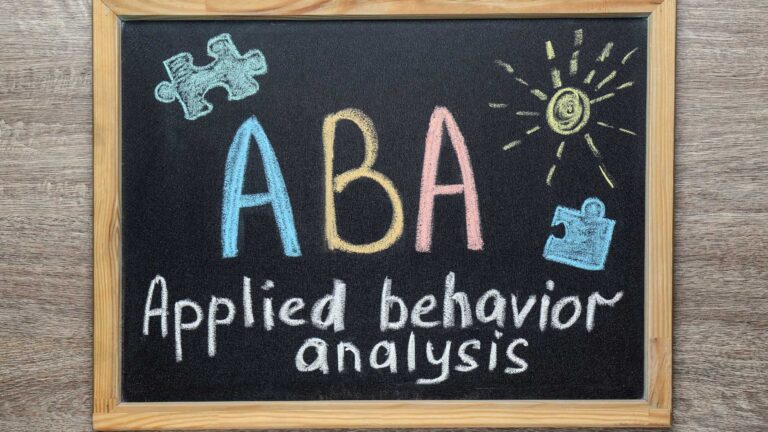What does ABA therapy accomplish?
ABA therapy outcomes: Upon receiving a loved one’s diagnosis of Autism Spectrum Disorder (ASD), parents and caregivers embark on a quest to find the most effective therapy. Their goal is to enhance their child’s quality of life and provide the necessary support to reach their full potential. A common question is, “What does ABA therapy accomplish?“
The medical community has recognized Applied Behavior Analysis, also known as ABA therapy, as the gold standard for achieving improved developmental outcomes for individuals on the spectrum. ABA therapy is crucial in helping these individuals acquire skills to engage with and contribute to the world around them.
The outcomes of ABA therapy encompass significant enhancements in various aspects of life. These include home life, school experiences, interpersonal relationships, and skills to navigate diverse environments. Such outcomes demonstrate the transformative impact of ABA therapy on the lives of neurodivergent individuals and their families.
In this blog post by ABA Centers of Florida, we delve into the expectations that parents and children with autism may have regarding ABA therapy. We will also examine the achievable outcomes and how this therapy can positively alter the life circumstances of those on the spectrum.
Exploring ABA Therapy
Applied behavior analysis is a scientifically validated therapeutic approach to enhance behaviors in individuals with developmental disorders. This method emphasizes understanding the underlying causes of behaviors and addressing any environmental factors that might trigger them. Gaining insight into behaviors is crucial for people with autism since they may display atypical behaviors or obstruct their daily experiences.
For instance, aggression or self-injurious behaviors often express feelings or needs that the individual may not know how to communicate otherwise. ABA imparts new skills to individuals with ASD, enabling them to mitigate problematic and unhealthy behaviors that complicate their lives. Furthermore, therapists can generalize ABA therapy outcomes across different settings and people.
5 Outstanding ABA Therapy Outcomes
Although the goals of applied behavior analysis plans are entirely individualized, most individuals with autism present problems with certain commonalities. The outcomes of ABA therapy span several areas, including:
- Enhanced Communication and Language Skills – ABA therapy outcomes notably include improving communication and language skills in individuals with autism. By providing alternative communication methods such as art, verbal and non-verbal expressions, written communication, electronic devices, and gestures, ABA enables these individuals to express their needs and desires effectively. Consequently, this reduces frustration and problematic behaviors, underscoring the multifaceted benefits of this therapeutic method.
- Boost Social Skills and Interactions – ABA therapy often helps individuals with autism to improve their social skills. These enhancements enable them to relate and interact more effectively with others. As a result, they can better connect with peers and family members. In many cases, children undergoing ABA therapy reap the benefits by developing the skills necessary to make friends, paving the way for more enriching social interactions and relationships.
- Promoting Independence – ABA therapy’s primary aim is to cultivate independence in children with autism. ABA therapists impart adaptative skills, from self-care tasks to completing daily routines to achieve independence. This approach enables children to participate more effectively in their everyday tasks. Regardless of autism severity, ABA therapy can foster progress in any child, enhancing not only their quality of life but also that of those around them. A National Library of Medicine study on the outcomes of ABA therapy demonstrated that children who received ABA services showed significant improvement in adaptive behavior, even those children with lower levels of functioning.
- Improvements in Cognitive and Academic Skills – Preparing for and navigating school experiences can be daunting for children on the autism spectrum. However, ABA therapy sessions can enhance their cognitive and academic skills. These improvements empower them to achieve school goals and grasp new concepts more effectively. Notably, a study published by ThinkPsych revealed significant IQ increases in children undergoing ABA therapy, signaling comparable learning outcomes.
- Reducing Complex Behaviors – Many individuals with autism may exhibit complex behaviors like aggression or self-injury. ABA therapy provides children with practical strategies to reduce or eliminate these behaviors. The treatment incorporates a positive reinforcement teaching strategy, offering a reward system for healthy behaviors. This approach helps individuals associate positive behaviors with rewards, making them more likely to repeat them.
Components of ABA Therapy Enhancing Outcomes
- Individualized Approach: A Board Certified Behavior Analyst (BCBA) comprehensively assesses a child’s abilities, deficits, and challenging behaviors before creating an ABA therapy plan. This information helps the BCBA develop a tailored treatment plan that considers each child’s unique needs and abilities. The child’s developmental and medical history and caregiver interviews contribute to this individualized assessment.
- Data Analysis: During ABA sessions, the BCBA and Registered Behavior Technician (RBT) monitor the child’s progress, gather data, and identify patterns. These insights inform decisions about customizing interventions to ensure continued progress.
- Positive Reinforcement: ABA therapists use positive reinforcement to increase the frequency of positive behaviors by providing motivational rewards. This strategy boosts ABA therapy outcomes and makes sessions more enjoyable and rewarding.
- Generalization of Skills: Parents can actively participate in ABA therapies, enabling the application of the skills learned during the sessions in everyday situations. Therapists equip parents with tools and strategies to encourage their child’s learning progress by reinforcing and utilizing these skills.
Explore the Outcomes of ABA Therapy with ABA Centers of Florida
At ABA Centers of Florida, we understand how life-changing the outcomes of ABA therapy can be for individuals with autism and their families. Our ABA experts deliver top-tier autism care, ensuring each child progresses towards the goals set in their therapy plan. We highly value personalization, recognizing that every child on the spectrum is unique, necessitating a specialized approach.
We significantly invest in research and technology at our clinical centers to advance ABA care and revolutionize the industry, benefiting the neurodiverse community through science-backed approaches. Additionally, our ABA therapists consistently train and update themselves on the latest techniques and advancements in autism care.
To start exploring the outcomes of ABA therapy for your child, call us at (722) 773-1975 or connect with us online.








